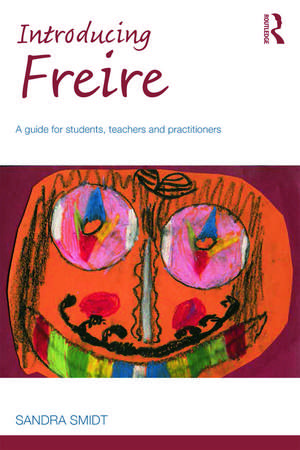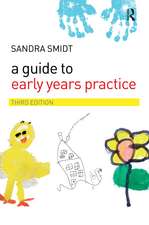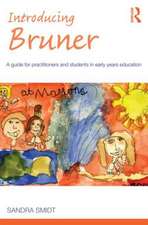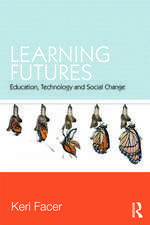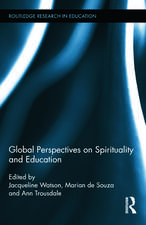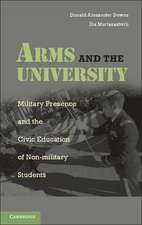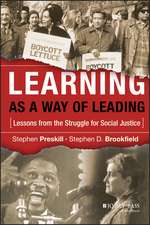Introducing Freire: A guide for students, teachers and practitioners
Autor Sandra Smidten Limba Engleză Paperback – 15 apr 2014
Themes covered include:
- the lasting impact of illiteracy;
- the benefits and potential in becoming literate;
- literacy, language and power;
- the differences between banking and dialogic education;
- the social and political nature of learning.
- what kind of teaching and learning do we want?
| Toate formatele și edițiile | Preț | Express |
|---|---|---|
| Paperback (1) | 413.64 lei 6-8 săpt. | |
| Taylor & Francis – 15 apr 2014 | 413.64 lei 6-8 săpt. | |
| Hardback (1) | 1160.47 lei 6-8 săpt. | |
| Taylor & Francis – 24 apr 2014 | 1160.47 lei 6-8 săpt. |
Preț: 413.64 lei
Nou
Puncte Express: 620
Preț estimativ în valută:
79.15€ • 82.64$ • 65.51£
79.15€ • 82.64$ • 65.51£
Carte tipărită la comandă
Livrare economică 04-18 aprilie
Preluare comenzi: 021 569.72.76
Specificații
ISBN-13: 9780415717281
ISBN-10: 0415717280
Pagini: 146
Ilustrații: 1 black & white tables
Dimensiuni: 156 x 234 x 10 mm
Greutate: 0.24 kg
Ediția:New.
Editura: Taylor & Francis
Colecția Routledge
Locul publicării:Oxford, United Kingdom
ISBN-10: 0415717280
Pagini: 146
Ilustrații: 1 black & white tables
Dimensiuni: 156 x 234 x 10 mm
Greutate: 0.24 kg
Ediția:New.
Editura: Taylor & Francis
Colecția Routledge
Locul publicării:Oxford, United Kingdom
Public țintă
Adult education, Postgraduate, Professional, and UndergraduateCuprins
1. The life and times of Paulo Freire 2. Literacy and Beyond 3. Dialogue, illiteracy and more 4. Naming, reading and writing the world 5. The definition, philosophy and politics of literacy 6. Part 1:What kind of teaching and learning do we want? 7. Part 2: What kind of teaching and learning do we want? Links to informal education 8. A Pedagogy for Liberation 9. Theater of the Oppressed: an elaboration of the work of Paulo Freire 10. No more silence: learning in informal settings
Recenzii
'Looking at the work of one of the most influential educators in the last century, someone who challenged conventional thinking on how teachers ought to teach and how learners ought to learn, this is a fascinatingly riveting and accessible read.' - Early Years Educator Magazine
"Looking at the work of one of the most influential educators in the last century, someone who challenged conventional thinking on how teachers ought to teach and how learners ought to learn, this is a fascinatingly riveting and accessible read." —Early Years Educator Magazine
"It will appeal to students, educators, and researchers who are interested in a brief overview of approaches to critical education theory and practice. … Smidt’s book offers a challenge to teachers to consider the implications of Freire’s pedagogical theory for their development as teachers with a conscious concern for fostering social justice and equity in their classrooms, communities, and the world." —PsycCRITIQUES
"Looking at the work of one of the most influential educators in the last century, someone who challenged conventional thinking on how teachers ought to teach and how learners ought to learn, this is a fascinatingly riveting and accessible read." —Early Years Educator Magazine
"It will appeal to students, educators, and researchers who are interested in a brief overview of approaches to critical education theory and practice. … Smidt’s book offers a challenge to teachers to consider the implications of Freire’s pedagogical theory for their development as teachers with a conscious concern for fostering social justice and equity in their classrooms, communities, and the world." —PsycCRITIQUES
Descriere
The famous Brazilian educator Paulo Freire has influenced educators, teachers and students in a broad tapestry of contexts and countries, as he challenged conventional thinking on how teachers ought to teach and learners ought to learn. By making his ideas accessible and relevant, this insightful and thought-provoking text draws out the relevance and topicality of Freire’s work and applies this to a wide range of educational settings, from adult education, through schools, to early years settings.
